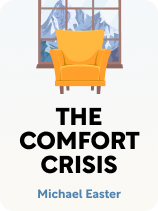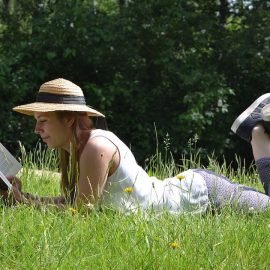

This article is an excerpt from the Shortform book guide to "The Comfort Crisis" by Michael Easter. Shortform has the world's best summaries and analyses of books you should be reading.
Like this article? Sign up for a free trial here.
When was boredom pronounced dead? What might be causing you to put off things you really want to do? Has modern society made you too comfortable?
In The Comfort Crisis, Michael Easter argues that crucial discomforts are becoming increasingly obsolete in the modern Western world. He asserts that our cozy conveniences harm our health and happiness by depriving us of challenges that our ancestors regularly faced.
Keep reading for six The Comfort Crisis quotes that will make you think again about the modern comforts you enjoy.
The Comfort Crisis Quotes
Michael Easter is an author, science journalist, and professor. After personally experiencing the life-changing benefits of embracing discomfort during his journey to sobriety, he began researching how physical and mental challenges can counteract the negative effects of modern-day comforts.
We’ve put together several The Comfort Crisis quotes, along with some context and explanation to help you understand Easter’s ideas.
“Finally, on June 29, 2007, boredom was pronounced dead, thanks to the iPhone. And so our imaginations and deep social connections went with it.”
Modern technology impedes boredom by tempting our attention whenever our mind starts to drift to uncomfortable territory. On average, we spend 11.6 hours with digital media each day. This includes time on our phones, in front of TVs, and on our computers. When we’re focused on social media and entertainment, we don’t have time for boredom.
Easter explains that boredom improves our creativity. One study found that participants who performed boring activities (such as reading a phone book for 15 minutes) demonstrated much stronger creativity than participants who didn’t endure a boring activity. This is because boredom puts your mind into an unfocused state that allows you to be open to more ideas.
“Fear is apparently a mindset often felt prior to experience.”
Easter explains that we limit ourselves with restrictive comfort zones because we evolved to have a disproportionate fear of failure. For most of human history, failure often meant death. For example, if you failed to successfully run down prey, you might starve. However, today’s failures rarely have serious consequences. For example, if you fail to complete the marathon you’re running, you’re unlikely to lose your partner, shelter, or food to survive. Therefore, Easter argues that our fear of failure isn’t as applicable to our modern circumstances, and it instead limits us from doing things that can make our life more meaningful.
“A false sense of permanence can cause a person to put off the things they truly want to do, thinking, ‘I can do that when I retire.’”
Easter asserts that modern materialism keeps us from deeply considering big-picture questions, such as death. In modern Western society, we typically hide from death because it’s uncomfortable to think about. Instead of recognizing the reality of our mortality, Easter explains that Westerners are commonly lost in the illusion of our permanence. When consulting a Bhutanese monk about this issue, the monk told Easter that our illusion of permanence causes us to distract ourselves with material pleasures and put off thinking about death.
“People who have rigid food rules are less in tune with their body’s cues of hunger and fullness, which leads them to overeat far past fullness.”
Easter explains that our evolutionary instincts make us dangerously susceptible to obesity in modern America. This is because humans evolved to take advantage of opportunities to gorge on food and stockpile calories whenever it was possible. Hunting and gathering weren’t as surefire for producing food as our trips to the grocery store today, so it was important for ancient humans to capitalize on calories whenever they were available to build fat reserves as insurance for the uncertain future. The problem is, we’re now constantly surrounded by food, but we’re still programmed with the same evolutionary instinct to gorge.
“Studies show that even dirt-poor people who live in rural China report being happier than infinitely wealthier Chinese city-dwellers.”
According to Easter, our pull to the city is a natural result of our evolutionary instincts to live in an environment that’s rich with survival resources and mating opportunities. However, urban comforts remove us from the natural environment we evolved in. This causes a swath of health issues and deprives us of many psychological and physical benefits. Easter references research showing that people living in cities are 21% more likely to suffer from anxiety and 39% more likely to have depression than people living in rural areas.
Easter says high population density and noise contribute to chronic mental health issues and unhappiness. Along with population density, city soundscapes cause stress.
“A group of roughly 150 people or fewer seems to be an ideal community.”
Easter says high population density and noise contribute to chronic mental health issues and unhappiness. He references research showing that, for most of human history, our ancestors lived in groups of about 150 people or fewer. This is called Dunbar’s number, after the anthropologist Robin Dunbar, who discovered this population sweet spot. According to him, a group of 150 people is big enough to adequately protect itself, gather resources, and share. However, when communities exceed this number, it becomes difficult to maintain close relationships and cooperate. Anthropologists argue that, even today, our brains are programmed to prefer a lower population density, and when we’re surrounded by unfamiliar faces in urban environments, this stresses us out.

———End of Preview———
Like what you just read? Read the rest of the world's best book summary and analysis of Michael Easter's "The Comfort Crisis" at Shortform.
Here's what you'll find in our full The Comfort Crisis summary:
- Why a modern, comfortable lifestyle is bad for health and happiness
- Why discomforts such as being in nature, fasting, and exercising are important
- Tips on how to make discomfort your friend






